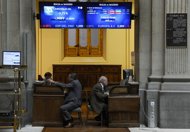Europe stocks rise on Spain auction, German survey

In late morning deals, London's benchmark FTSE 100 index climbed 0.73 percent to 5,707.48 points, Frankfurt's DAX 30 gained 1.0 percent to 6,691.14 points and in Paris the CAC 40 grew 1.39 percent to 3,249.72.
Madrid rallied 1.0 percent and Milan surged 2.23 percent.
In foreign exchange trading, the European single currency firmed to $1.3166 from $1.3143 late in New York on Monday.
Markets reacted to news that Spain had to pay sharply higher borrowing rates in a short-term debt auction.
Rates leapt for the auction of 12- and 18-month bonds, allowing the Spanish Treasury to raise a higher-than-targeted 3.178 billion euros ($4.2 billion), albeit at a high price.
"Madrid must be breathing a sigh of relief -- it has avoided a catastrophic failed auction for another day," said analyst Kathleen Brooks at trading site Forex.com.
"It managed to sell 12- and 18-month debt with relative ease today. However, the stronger demand was driven by a sharp increase in bond yields."
When compared to a similar auction on March 20, the rate on 12-month debt soared to 2.623 percent from 1.418 percent and the rate on 18-month debt jumped to 3.110 percent from 1.711 percent.
The debt sale was the first of two major tests of waning market confidence in Spain this week, with the state hoping to raise up to 2.5 billion euros in an auction of benchmark 10-year government debt on Thursday.
The auctions come at a time of heightened tensions in the Spanish bond market, with yields on 10-year goverment bonds soaring above 6.0 percent in past days for the first time this year.
Analysts and investors are showing concern about the ability of Spain to reduce its annual public deficit at a time when the unemployment-scarred economy is plunging into recession.
Chris Beauchamp, an analyst at IG Index trading group, said investors were now eagerly awaiting other European bond auctions later in the week.
"Investors will have to wait until Thursday for a more concrete gauge of sentiment, when Spain sells longer-term bonds and France also conducts an auction ahead of the first round of its presidential election," he said.
Sentiment was also boosted Tuesday by data showing that German investor confidence has risen for the fifth month in a row.
The ZEW think tank's economic expectations index edged up by 1.1 points in April to stand at plus 23.4 points, the organisation said in a statement.
The figures defied market expectations for a drop in face of concerns about the debt crisis and rising raw material prices.
"The positive ZEW reading adds to recent encouraging signals from the German economy," noted ING economist Carsten Brzeski.
"Higher oil prices, new market turmoil and a return of sovereign debt woes, it looks as if -- at least in the eyes of financial analysts -- nothing can stop the German economy."
Back in Madrid, Spanish oil giant Repsol saw its share price plummet by more than eight percent in morning deals on Tuesday after Argentina said it would nationalise the group's subsidiary YPF.
The stock later stood at 16.36 euros, down 6.41 percent in value from Monday's closing level.
Argentinian President Cristina Kirchner rejected warnings from Madrid and announced on Monday that her government would partially expropriate Repsol's 57.4-percent stake in YPF.
The national and regional Argentinian governments are to own 51 percent of YPF, which is the country's biggest oil company.
The move has opened a deep rift between Argentina and Spain, which normally maintain good relations, with Madrid warning that it would act to protect its interests.
Repsol has said it will take all possible legal measures to fight the Argentinian decision, which Repsol charged "violates the most fundamental principles of judicial security."
What the stars mean:
★ Poor ★ ★ Promising ★★★ Good ★★★★ Very good ★★★★★ Exceptional
Related Contents
Latest News
More News
- Cashless payments hit 28 times GDP in 2025 (February 04, 2026 | 18:09)
- SSIAM and DBJ launch Japan Vietnam Capital Fund (February 04, 2026 | 15:57)
- Banks target stronger profits, credit growth in 2026 (February 04, 2026 | 15:43)
- Vietnam on path to investment-grade rating (February 03, 2026 | 13:07)
- Consumer finance sector posts sharp profit growth (February 03, 2026 | 13:05)
- Insurance market building the next chapter of protection (February 02, 2026 | 11:16)
- NAB Innovation Centre underscores Vietnam’s appeal for tech investment (January 30, 2026 | 11:16)
- Vietnam strengthens public debt management with World Bank and IMF (January 30, 2026 | 11:00)
- Corporate bond market poised for stronger growth cycle (January 28, 2026 | 17:13)
- Vietnam's IPO market on recovery trajectory (January 28, 2026 | 17:04)

 Tag:
Tag:




















 Mobile Version
Mobile Version